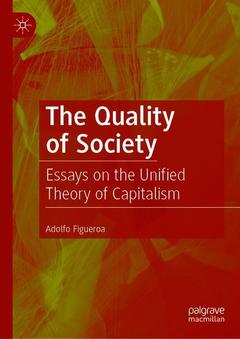The Quality of Society, 1st ed. 2019 Essays on the Unified Theory of Capitalism
Auteur : Figueroa Adolfo

This book explores the policy implications of the unified theory of capitalism?how economic growth has led to a new epoch, the Anthropocene, and it presents a new set of economic principles that are needed in this new age. The unified theory of capitalism has been published as a new scientific endeavor, attempting to present new economics for the Anthropocene age that are empirically verifiable and fully consistent with the physical sciences.
This book elaborates on the implications of the unified theory for both the science of economics and for public policies. In particular, this book develops in more detail the policy implications, discussing the fundamental economic and societal policy issues of our time?employment, inequality, the environment, and quality of life?in empirical terms.
Adolfo Figueroa is Professor Emeritus of Economics at Pontifical Catholic University of Peru. He is the author of three previous books with Palgrave Macmillan: Growth, Employment, Inequality, and the Environment (2015); Rules for Scientific Research in Economics (2016); and Economics of the Anthropocene Age (2017).
Constructs a general economic theory of contemporary world capitalism that goes beyond mainstream neoclassical and Keynesian theory by insisting that economic theory should be fully scientific
Directly addresses the pressing issues of our day and offers policies based on scientific theory to remedy them
Examines the links between economic growth, income inequality, democracy, and degradation of the environment
Date de parution : 02-2019
Ouvrage de 289 p.
14.8x21 cm
Disponible chez l'éditeur (délai d'approvisionnement : 15 jours).
Prix indicatif 105,49 €
Ajouter au panier


